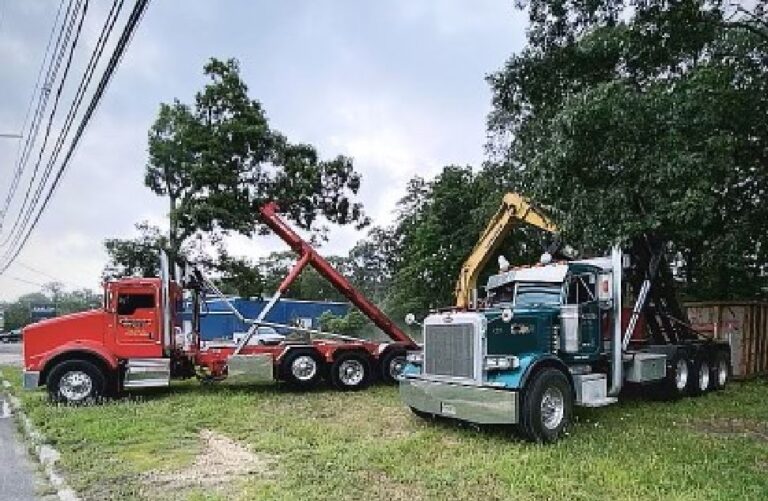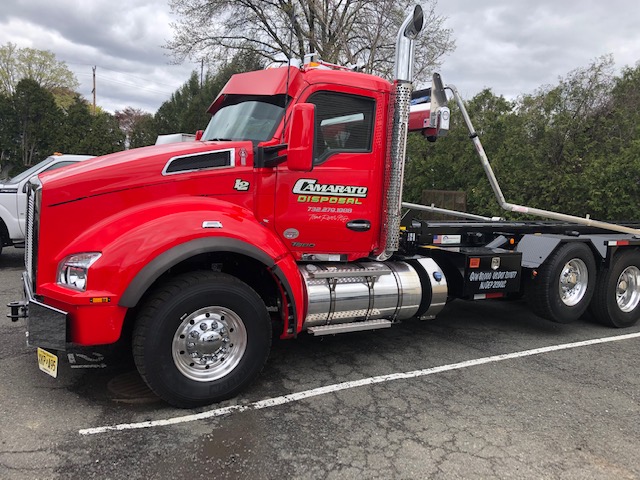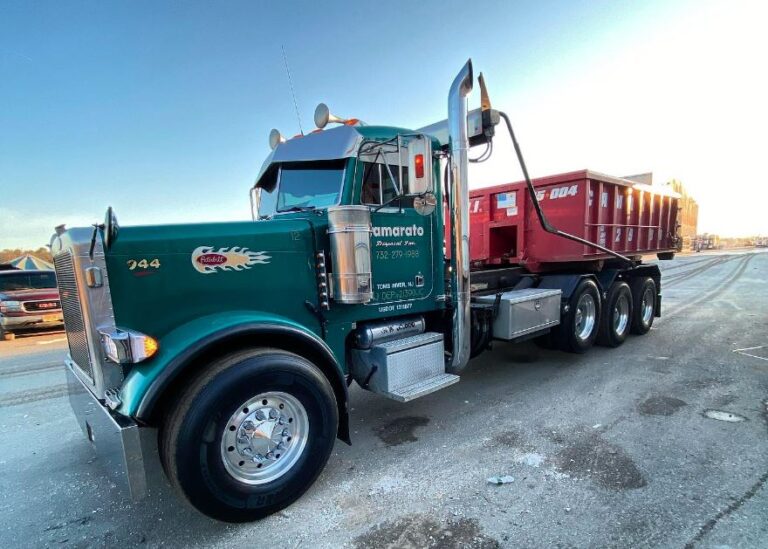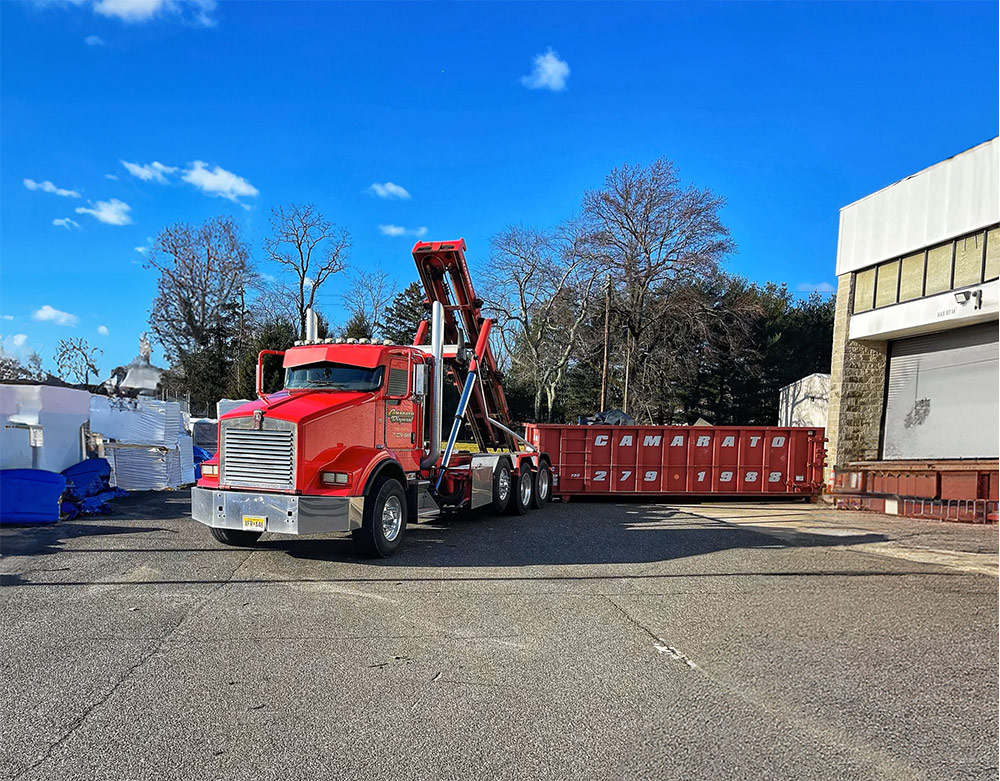
Navigating the dumpster rental process can be a tricky business, especially when it comes to managing a construction project. Whether you’re in Ocean County, Monmouth County, Middlesex County, or Mercer County, renting a dumpster from a reputable dumpster rental company like Camarato Disposal is often a crucial step.
Since 1998, Camarato Disposal has been providing waste management services and dumpster rentals in Toms River, New Jersey, offering a variety of sized containers to suit diverse needs.
However, even with an experienced company at your disposal, understanding the ins and outs of the dumpster rental process is key to avoiding unnecessary complications. Missteps such as failing to correctly estimate the size of the dumpster you need, not properly disposing of hazardous materials, or not planning for the optimal placement of the dumpster, can lead to delays or extra costs in your waste disposal process when renting a dumpster.
1. Not Estimating the Correct Size When Renting a Dumpster
One of the most common pitfalls in the dumpster rental process is not accurately estimating the correct size dumpster for your project’s needs. This mistake can have significant implications for both your budget and the efficiency of your waste management process.
When you underestimate the dumpster size, you risk overloading the container, which may lead to additional charges or even extend your rental period as you wait for another dumpster to be delivered. Conversely, overestimating the size means you are paying for space you don’t need, creating an unnecessary expense.
At Camarato Disposal, we offer a variety of dumpster sizes, ranging from 10-yard containers for smaller projects to 40-yard containers for larger scale operations. However, selecting the appropriate dumpster size can be challenging, particularly for first-time renters.
Here are some practical tips to help you avoid this common mistake:
Assess Your Waste Volume
Begin by estimating the volume of your waste. The type and extent of your project can provide clues about the size dumpster you’ll need. A small home renovation might only require a 10 or 15-yard dumpster, while a larger construction project could necessitate a 30 or 40-yard dumpster. Estimating the weight should be part of this process as well.
Consider the Nature of Your Waste
Different types of waste occupy different amounts of space. Light, bulky items such as yard waste might quickly fill up a dumpster, whereas heavier debris like concrete or soil might necessitate a smaller but weightier dumpster. Remember to consider the weight limit of each dumpster size when dealing with heavy materials.
Consult with a Professional
If you’re unsure about the dumpster size that best fits your project, don’t hesitate to seek professional advice. Our experienced team at Camarato Disposal can provide guidance based on the specifics of your project, ensuring efficient waste management.
Plan Your Dumpster Placement
Finally, consider where the dumpster will be placed. Make sure the location can accommodate the size of the dumpster, and that there’s easy access for drop-off and pick-up.
By correctly estimating your dumpster size, you can avoid unnecessary costs, delays, and complications. And remember, when in doubt, it’s better to opt for a slightly larger size. Your project—and your budget—will thank you.
2. Ignoring Local Regulations and Permits When Renting a Dumpster
Understanding local regulations and securing necessary permits is a crucial aspect of the dumpster rental process. Ignoring these can lead to costly fines and delays in your project. In New Jersey, particularly in counties such as Ocean County, Monmouth County, Middlesex County, and Mercer County, there may be specific rules and regulations about dumpster rentals that you need to adhere to.
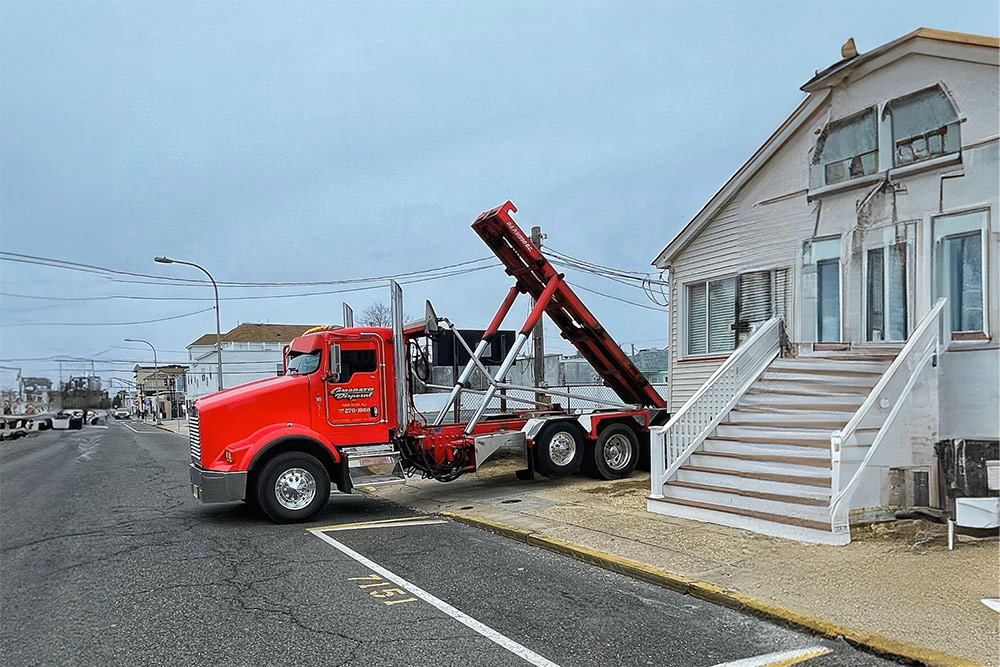
Understanding Local Regulations
Local regulations regarding dumpster rentals can vary widely. They may dictate where you can place a dumpster, what size dumpster you’re allowed, and what types of waste can be disposed of. For instance, certain hazardous materials are typically prohibited from being thrown in a dumpster.
In New Jersey, different municipalities may have their own set of rules. It’s essential to familiarize yourself with these before beginning your project. Camarato Disposal, serving the area since 1998, is well-versed in these regulations and can provide guidance and support throughout the rental process.
Securing Necessary Permits
In some cases, you might need a permit to place a dumpster on your property or on public land. The requirements for these permits can vary, but they often include information about the dumpster size, the length of time it will be in place, and the type of debris being disposed of. Within our New Jersey service area, you’ll need a permit to have a dumpster placed on the street. There are also some HOA organizations that require customers to acquire dumpster permits.
To obtain a permit, you’ll generally need to apply through your local city or county office. The process can take some time, so it’s best to start as early as possible. The team at Camarato Disposal can help guide you through this process, and let you know when you need a permit and how to get one.
Complying with Local Rules
Once you understand the local regulations and have secured any necessary permits, it’s essential to comply with these rules throughout your rental period. This includes adhering to the stipulated weight limit, not overfilling the dumpster, and not disposing of prohibited items.
By being aware of and complying with local regulations and permits, you can avoid unnecessary complications and ensure your project runs smoothly. Whether you’re renting a 10-yard or 40-yard dumpster, understanding these rules is an important part of the process.
3. Choosing the Wrong Rental Company When Renting a Dumpster
Choosing the right dumpster rental company is just as important as selecting the correct dumpster size and understanding local regulations. Unfortunately, many people make the mistake of hiring the first company they come across or the one offering the lowest price, without considering the company’s reputation and service quality.
The Importance of a Reputable Rental Company
A reputable rental company like Camarato Disposal, which serves counties throughout central New Jersey, can ensure a smooth and efficient waste management process. We offer a variety of services, from dumpster and dump truck rentals to construction recycling, scrap metal disposal, and even demolition services.
Choosing a reliable company guarantees you’ll have access to a variety of dumpster sizes, from 10-yard to 40-yard containers, ensuring you can find the perfect fit for your project. Camarato Disposal prioritizes eco-friendly practices and compliance with local regulations, safeguarding both the environment and your peace of mind.
Identifying Reliable Companies
When looking for a reliable dumpster rental company, consider the following:
- Experience: Companies that have been in business for a long time, like Camarato Disposal, often have a wealth of experience to draw from and a proven track record of delivering satisfactory services.
- Range of Services: Look for a company that offers a variety of services. This versatility suggests that they are well-equipped to handle any surprises your project might throw at them.
- Customer Reviews: Reading reviews from previous customers can give you a good sense of what to expect from the company. Pay attention not only to the positive reviews but also to how the company responds to any negative feedback.
- Regulatory Compliance: Ensure the company complies with local regulations and can assist you in understanding and adhering to these rules.
By choosing a Camarato Disposal, you can avoid many of the common pitfalls associated with waste disposal, ensuring your project proceeds smoothly and efficiently. Remember, the cheapest option isn’t always the best. Instead, prioritize experience, service range, customer satisfaction, and regulatory compliance.
4. Overloading the Dumpster
Overloading a dumpster is a common mistake that can lead to unexpected complications and expenses. It’s crucial to understand the potential dangers and consequences of this error, as well as ways to prevent it from happening.
The Dangers of Overloading a Dumpster
Exceeding the weight limit or fill line of your rented dumpster isn’t just a minor oversight; it can pose serious risks.
Safety Hazards: An overloaded dumpster can become unstable, potentially tipping over and leading to injuries or property damage. Furthermore, debris protruding from an overloaded dumpster can pose risks to passersby or interfere with safe waste transport.
Regulatory Violations: Each municipality has its own regulations regarding waste disposal, including limitations on dumpster weight. Exceeding these limits could result in fines or other penalties.
Consequences of an Overloaded Dumpster
In addition to safety hazards and regulatory violations, overloading a dumpster can lead to logistical problems and additional costs.
Delayed Waste Removal: If your dumpster is too full to be safely picked up and transported, you’ll need to remove some of the waste yourself, which can delay your project.
Additional Costs: Overloading a dumpster often results in extra fees, including overage charges for exceeding the weight limit and additional rental days if you need to unload some of the waste yourself.
Preventing Overload When Renting a Dumpster
Preventing dumpster overload requires careful planning and communication.
Selecting the Appropriate Dumpster Size: One of the best ways to prevent overloading is by selecting the right dumpster size from the start. A reputable dumpster rental company can help you estimate the size you’ll need based on the nature and volume of your waste.
Understanding Weight Restrictions: Familiarize yourself with the weight restrictions for your chosen dumpster size. Different types of waste can weigh more than others, so consider both the volume and weight of your waste.
Communicating with Your Rental Company: If you’re unsure about anything, don’t hesitate to ask your rental company. They can provide guidance on everything from weight restrictions to proper loading techniques.
By understanding the dangers and consequences of overloading a dumpster and using these strategies to prevent it, you can ensure a smoother, safer, and more cost-effective waste disposal process.
5. Not Planning for Proper Placement When Renting a Dumpster
When it comes to renting a dumpster, one key aspect that often goes overlooked is the planning of its placement. The location of your dumpster is more crucial than you might think and can dramatically impact the overall success and efficiency of your project.
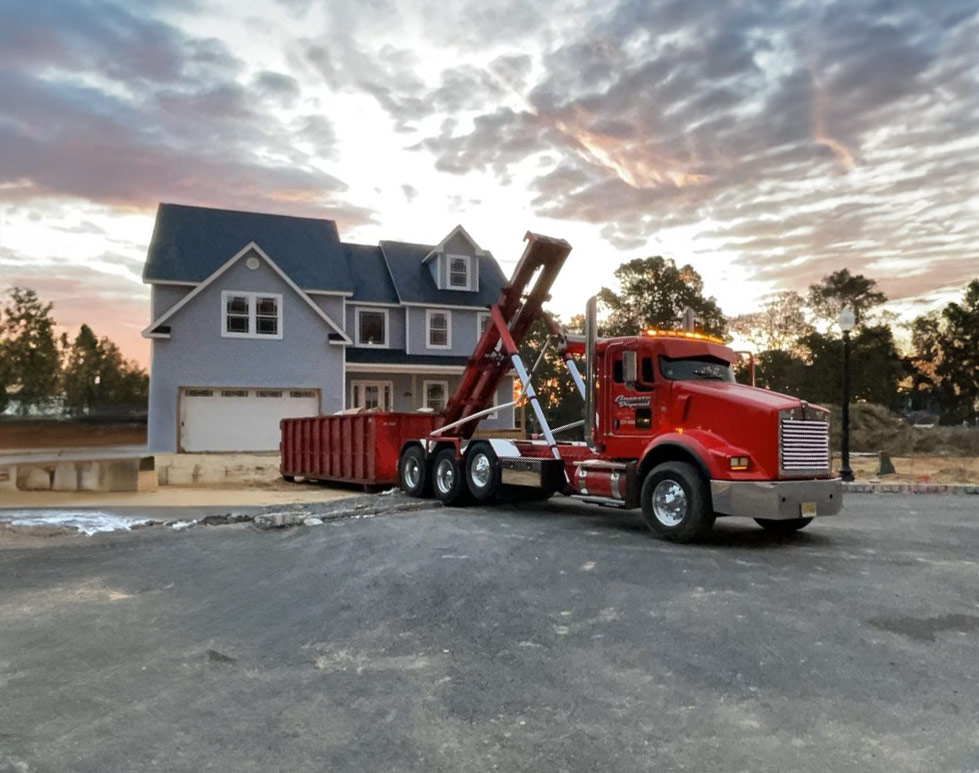
Why Proper Dumpster Placement Matters
Choosing the right spot for your dumpster isn’t just about convenience; it’s also about safety, legality, and preservation of your property.
Ease of Use: A dumpster that’s placed too far from the work site can make waste disposal tedious and time-consuming. Conversely, a well-placed dumpster can streamline operations and boost productivity.
Safety Concerns: An improperly located dumpster can pose significant safety risks. It needs to be on even ground to prevent tipping and should not obstruct pedestrian or vehicular traffic.
Legal Compliance: Many cities have regulations about where dumpsters can be placed, especially if they’re going to be on the street or another public area. Non-compliance can lead to fines or other penalties.
Preventing Property Damage: Dumpsters are heavy, even without any waste in them. Placing them on soft ground or an unsuitable surface can lead to property damage.
Tips for Choosing an Appropriate Dumpster Location
Planning for proper dumpster placement doesn’t have to be a daunting task. Here are some tips to help you choose the best location:
Assess Your Site: Take the time to thoroughly assess your site and identify where the dumpster would be most accessible yet least disruptive.
Consult with your Rental Company: Your dumpster rental company can provide valuable insights on the best practices for dumpster placement based on their experience.
Check Local Regulations: Always check local regulations or consult with city officials if you’re unsure about where you can legally place your dumpster.
Protect Your Surface: If you must place the dumpster on a potentially vulnerable surface, consider using protective measures like plywood under the dumpster to prevent damage.
By understanding the importance of proper dumpster placement and using these tips to choose an appropriate location, you can ensure a smoother, safer, and more efficient waste disposal process.
Understanding Common Mistakes When Renting a Dumpster
Effective waste disposal is a multifaceted process that requires careful planning and consideration. It’s essential to avoid common mistakes such as choosing the wrong dumpster size, improper placement, and overloading the dumpster to ensure a smooth and efficient operation. Remember, safety and regulatory compliance should be your top priorities when managing waste disposal.
By investing time upfront in planning and communicating with your dumpster rental company, you can avoid unnecessary costs, delays, and legal complications. These practices will not only make your project more efficient but also contribute to a safer and more environmentally responsible waste management approach.

